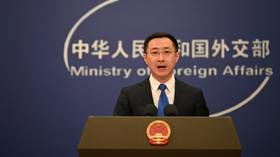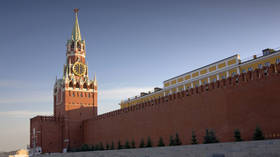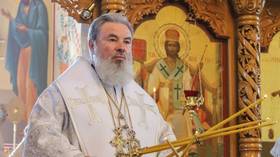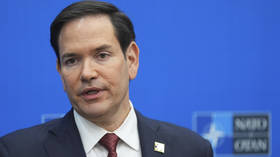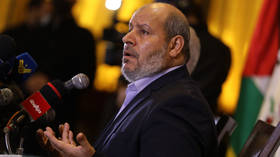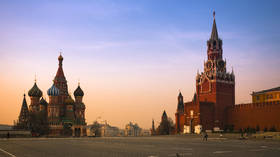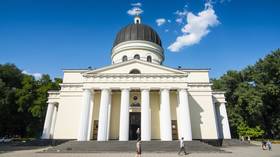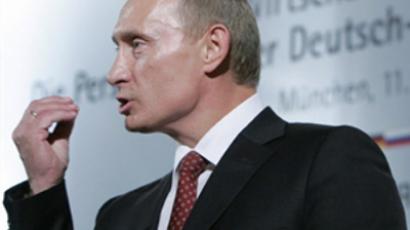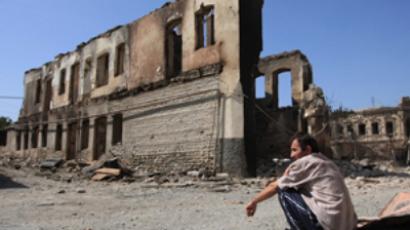Putin on banned protests: no permission – get hit on the head
Russian Premier Vladimir Putin has slammed opposition rallies as “provocation” and said protesters would “get hit on the head” for taking part in banned gatherings.
The statement was made in an interview with the Kommersant Daily’s correspondent Andrey Kolesnikov. The location of their conversation was rather unusual, as the two spoke while Putin was driving a Russian-built, yellow Lada Kalina Sport car along the new highway connecting the country’s East and West. The premier wanted to inspect the road between Khabarovsk and Chita personally. During the 180-kilometer trip with the journalist, the premier outlined his view on both internal and foreign policy, commented on the presidential election in 2012 and stated that he has nothing to regret.“Is it difficult to be driving and at the same time discussing matters that will soon be on everyone's lips? Your self-control is not as good now… Are you sure you won't regret it later?” Kolesnikov wondered.“No,” Putin said, laughing. “Actually, I'm having a great time. I'm enjoying some recreation, for the first time in ten years, perhaps.”Crackdowns on opposition rallies – an issue that Russia has often been criticized for in the West – was one of the topics that popped up. Putin stressed that opposition movements – all of whom stand for the rule of law – must also stick to the law and obtain official permission before staging a rally.“What is the rule of law? It is abiding by the law. What does the current legislation say on the [opposition] march? You should get permission from local authorities. Have you got it? Then you can go out and demonstrate. If not, you have no right. If you went out without a right to do so – expect a baton to the skull. That’s it!” he said.The comments referred to the so-called Dissenters March in support of Article 31 of the Constitution, which guarantees freedom of assembly. About ten times now, human right activists and the opposition have attempted to stage rallies on the last day of each month that has 31 days. However, each time the gathering ends up with clashes with police and arrests, as Moscow authorities banned the demonstration at the capital’s central Triumfalnaya Square and the protesters insist they want no other site to stage their rally.“Yes, I have heard on a number of occasions that they were protesting on Triumfalnaya Square but were dispersed. I ask: why were they dispersed? Because they were allowed to demonstrate in one place, but gathered at another instead. I say, but why did they go to the other place? I still cannot understand this,” Putin said.“They have something to say, right? Am I right? They want to criticize the government. Well, in London, people are assigned places to gather for protests, and if they protest where they are not supposed to, they come in for a trouble. Not permitted but still came? Get it! And nobody sees it as wrong! If their goal is to say something, they should do it a different way,” he said.“For example, how about inviting …Andrey Ivanovich Kolesnikov [Kommersant's correspondent] and a couple or more TV crews from the West and the East, taking out a Jolly Roger banner and saying out loud ‘Screw the government!’ and repeating it till you get what you want? You know what's good about today's world? You can say things round the corner of a public toilet, but they will be heard by the whole world because TV crews will be there! So why not just say whatever there is on your mind and call it a day?” the PM ranted.But the goal is very different there, Putin said. “The goal is to defy current legislation, to say ‘We want a legal state for somebody else, not for ourselves. As for us, we will do what we want, and will provoke you to kick our asses!’ So they splatter themselves with red paint and say that the powers that be are anti-people and suppress human rights,” he said.According to the premier, by holding banned rallies, the opposition provokes the police to use force against them.“If the aim is provocation, it will always be a success. But is if the aim is to inform the international and Russian public, there is no point in provoking and breaking the law,” he stated. “If the aim is to make authorities compromise and they do so, there will be another cause for a provocation. And this will keep going for ever,” he added.
No mistakes were made
Vladimir Putin has been in power for over a decade, having first appeared on the political arena in 1999 as the Russian premier, and then acting president. Following two terms in the presidential seat from 2000 to 2008, the politician is now the Prime Minister again.He says that, looking back, he has no decisions to regret. As to what he sees more difficult to cope with, economics or politics, Putin said: “Unlike economic decisions that can, in fact, be corrected, political decisions are hard to correct.” However, answering to a question as to whether or not there were decisions he would like to correct, the premier was quite certain – “No”.“If you do something well, if you are completely devoted to what you do, even looking after a vegetable garden would be interesting,” he said. “I am often told ‘this country is big and it must be hard for you to be in charge.’ But I simply know and am convinced that size is not important,” he stated.The premier recalled that when he worked in St. Petersburg, which has a population of five million people, he “worked from morning till night every day, and I didn’t find that easier.”“The more specific the task you have, the more difficult it is to fulfill it,” he added. “As for the results, they are either yes or no. But if we think about globally, decisions that are made at a political level influence all sides of life and affect each and everyone. In other words, political decisions are more responsible. But it’s only a plus for those who make these decisions,” he said.Putin admitted though that “some of my actions could have been wiser, more accurate and more effective”. But those were not mistakes in making a choice for development or a selection of methods for solving problems. He recalled the criticism that the leadership was facing for accumulating too much finance in reserve funds and opponents’ calls on the government to give that money to people.“…We handed out what we deemed necessary in the form of allowances, benefits, etc. We developed national projects. But now I am going to say the most important thing: even at that time we understood that we wouldn’t avoid global crises and that we would need reserves. The most important thing is that money that is not earned by the real sector cannot be thrown into the country’s economy,” he stressed.Kommersant noted that this was said so passionately that the steering wheel made a sharp turn in Putin’s hand and the car almost jumped on the opposite lane. But there was no need to worry as there were no oncoming vehicles and traffic police officers were clearing the way for the yellow Lada.“You cannot take all the cream off the oil and gas industry and pour it into the economy,” Putin went on, adding that this would lead to inflation and stimulate the growth of branches oriented at exports rather than internal demand.“The Central Bank and the government used to hamper that process, but apparently not sufficiently enough. As a result, we saw the development of industries oriented at external rather than internal needs,” he said. “But when the international market shrank our manufacturers of petrochemical fertilizers and metals did not know what to do with their goods. Their prices were too high for the domestic market, and there was no demand whatsoever on the international market. It was a double whammy, as it affected both prices and production volumes. Had the Central Bank regulated these processes (they have many different instruments: e.g., they could have stopped our companies from importing too much, or they could have introduced some limitations on exports), our economy would have developed in a more balanced way. Should the government be rebuked for this? I guess so, especially since I admit it myself,” Putin said.However, he said, the government is rebuked because “we don’t give them enough”. “But the thing is, had we given them more when the crisis started, the situation would have been even worse. Eventually, we managed to stay afloat. Our policy was appropriate and satisfactory,” he concluded.
“I prefer to interfere rather than to watch things collapsing”
One of the questions referred to Putin’s 11-year-long time in power. “Why? Do you think there are some things only you can do?” the Kommersant’s correspondent asked.“No, I think we should all work together to create a mechanism for a stable Russian state. It should be resistant to internal troubles and external problems, and we all need to feel confident that it’s a well-balanced mechanism,” Putin responded. “The relationships within government should be balanced, and the relationship between civil society and government should be balanced. We should have a real separation of powers. Each branch should be self-sufficient and have its own competence. At the same time, no branch should meddle in the affairs of other branches,” the premier stated.As for what he should or should not do, he said there are only two options: “I can sit on a riverbank and watch the water go by, watch things collapsing and perishing, or I can interfere. I prefer to interfere.”The PM stressed that nothing can change overnight and it takes decades to build “perfectly balanced state.” In some countries, he noted, this goal cannot be achieved at all. “It’s not as easy as making pancakes, after all!” he added. But for Russia there is light at the end of the tunnel.“What we are doing now convinces me that we are on the right path,” stated Putin. “Of course, we couldn’t help considering the realities,” he observed, adding that the entire financial system fell apart back in the USSR and the entire social system into the bargain.“The economy began to crumble because it was geared to a closed production… The Iron Curtain where you consume what you produce regardless of its quality,” he said. According to the PM, Russia’s current economy can be defined as a “transition-period economy” which is served by a transition-period political system. “As the economy matures and grows more effective, we’ll certainly need some different political regulation methods,” he said.
Election 2012: nominating successor is common practice
As Russia’s 2012 presidential election looms on the horizon, the question many would want to get some clarity on who will become the country’s next leader. Despite Medvedev having fueled speculation hinting at the possibility of a third candidate running for presidency, currently the two main possible candidates are him and Vladimir Putin. Neither of them has excluded taking part in the race for Russia’s top job. However, Medvedev did rule out that he would compete with Putin, saying, “I do not want to see a power struggle; it would be bad for Russia.”Earlier, Putin said that he would “sit down” with Medvedev and decide who of the two would be nominated a candidate for the post, “because we are of the same blood and of the same political outlook.” The statement was met with criticism by opponents, as it sounded as though the people are actually left with no choice.“It’s a worldwide practice,” Putin told Komemrsant. “An outgoing president in the United States always offers a successor. It’s absolutely normal if an outgoing person offers his country a certain gentleman whom he knows is decent and professional and will efficiently perform presidential functions.” And there are no guarantees that the political struggle will not be lost.“Albert Gore lost in his time. But what can we do: he lost, and Bush’s candidate also lost. But what of it? It’s life,” Putin said. “The president offered his candidate to the country, but the nation didn’t accept him. Well, then another person is going to do the job. He suggested his vice-president. It’s a world practice. Is there anything unusual about it? I cannot grasp why it’s normal there and seems to be something out of the ordinary here?”But in the United States, journalists noted, the presidential race kicks off after a nomination, while in Russia, if one person nominates another person, the latter is sure to become president.“So it’s very interesting whom Dmitry Medvedev is going to nominate for the presidential post. It may be him or it may be you. When you say that you are going to sit down and agree, you are adding the intrigue for the next six months,” Kolesnikov said.“No, we are not adding anything! If I hadn’t said that, you would have made up something else. Let’s go!” was the premier’s response.The PM added that he is not “making a fetish” out of 2012 problems.“As a whole, our country has been developing normally; I don’t see any particular large problems. The financial crisis has held us back somewhat, but on the other hand, it has helped us concentrate on priorities. It’s crucial that the problems of 2012 do not distract us from the way of this stable development. Even though this is the time when political struggles happen, which distract society and the state from the economy. But this is that extra cost to be paid to maintain competitiveness of the society and the state,” he said.
“Munich speech still topical today”
Back in 2007, Putin gave his famous speech at the 43rd Munich conference on Security Policy.“I believe it was a helpful speech, as I was telling the truth, essentially. I did tell the truth!” Putin said commenting on whether he thinks that speech was still relevant today.“But even so, you didn’t tell it right away. Several years had passed before you fathomed it,” Kolesnikov noted.“You said the right thing now,” Putin agreed. “I just couldn’t fathom it. It wasn’t because I didn’t have the courage to say it. In reality, it was very simple, just like in everyday life.” “They [the West] had told us one thing, yet done something different altogether. They cheated us in the very literal sense of the word! While the USSR was pulling out troops from Eastern Europe, the NATO Secretary General told us the USSR must rest assured that NATO would not expand beyond its then-current borders. So where is all that now? This is what I asked them. They had nothing to tell me. They had cheated us, plain and simple,” Putin stated.“By the way,” he added, “I must say – and I'm not too shy to say it here out loud – in big politics, such things are quite common, and we have to keep that in mind.”“Saying that was the right thing to do. Everybody was living by default; some understood what was going on, some didn’t,” Putin underlined.He recalled a recent scandal over the detention of a Russian pilot, Konstantin Yaroshenko, in Liberia and his extradition to the US over allegations of being involved in drug trafficking.“His American lawyer, speaking in front of an American court, worded the problem as precisely as it ever gets: a Russian citizen is facing charges of smuggling or trafficking drugs in an African country. What do US interests have to do with that? Nobody can even say that clearly! They took a citizen of another state and sneaked him to the States. Now what good is that?!” Putin said.“In this sense, what I said in Munich is still topical today,” he added.
“I believe Obama is sincere”
Following Putin’s remarks that his 2007 statements are still relevant today and his anger over the US extraditing a Russian pilot, he was asked if he believes in the so-called “reset” of Moscow-Washington relations.“You know, I very much want to believe in it. Second, I want the reset very much. Third, I see that the determination of today's US administration to improve relations with Russia is clearly visible now,” he said.However, he noted, while the US demonstrates its intention to reset relations, “there are other things at the same time.”For example, the further rearmament of Georgia is continuing. “What's that for? Well, come on, we see it! If there hadn’t been rearmament two years ago, there wouldn’t have been the aggression, and blood wouldn’t have spilled there,” Putin said.He noted that, “Even our European friends had told our American counterparts about that, but the latter preferred not to respond.”“How did it all end up? It ended up with a war. And now they keep rearming Georgia,” Putin said.He recalled the Bush Administration’s plans to deploy a missile defense system in Eastern Europe – an issue that remained a stumbling block in relations between the two powers.“We have expressed our position regarding the missile defense system in Europe. We seem to have agreed that there will be no antimissiles in Poland, and the issues about radars in the Czech Republic is yet to be resolved. Excellent! And then they announce right away that they plan the same in other European countries. So where is the reset? We don’t see it in this area,” Putin said.Putin said that he has a feeling that President Barack Obama “is sincere”.“I don’t know what he can do and what he cannot; I'd like to see if he succeeds or not. But he definitely wants it. I have a feeling that this position of his is sincere,” he said.
“The more you care about popularity, the quicker you lose it”
Commenting on the approval ratings fall in recent months – both for Putin and president Medvedev – the PM said that he does not watch them closely, but admitted that they fluctuate because of the economic crisis.“It’s a hard time for many people, and I understand them…We are expending a lot of effort, but the result is not reaching everybody. I can tell a person what we are doing, but he may easily tell me to go to hell…” he said.“But if people don’t feel the results of our work, then I am doing a bad job. What can I say to that? It’s only that this person would be right,” the Prime Minister said.According to Putin, when it comes to important projects, he sets priorities.“If I think this or that problem is a priority, I stop worrying about political or administrative losses that we may suffer while resolving it. I don’t even worry about consequences that I personally may have to face – for example, some people may say, ‘Look, he started working on this problem and he failed.’ If I think that something is important for our country, I mobilize. I’m telling you the truth; that’s the way it is,” he said.It takes decades for some problems, such as housing, to be settled. “It would be very easy for me to say to myself, ‘Well, the situation has been awful for a long time, and it’s no big deal if it stays this way for some time. Everybody’s accustomed to this, everybody’s complaining, but you can always tell people that we don’t have enough money for these things, or that we need money to raise salaries, and so on,’” he said. However, he went on, “we don’t do this.”The PM stressed that WWII veterans have been provided with housing and now the focus is on servicemen.“It seemed that this was impossible! Just impossible! But we are doing it, and we will finish this work,” Putin stated.According to the premier, “the more a politician cares about his popularity, the quicker he loses it.” That is because one becomes dependent on all sorts of phobias, he explained. “Before making a decision, he always thinks how it will affect his popularity. He no longer thinks about business. This affects the outcome, and people sense it straight away. Our people have a very good nose!”
On talk with rocker Shevchuk
The heated dialogue between the premier and famous Russian rock musician Yury Shevchuk made headlines in May. Back then, representatives of the Russian intelligentsia got together in St. Petersburg to attend a charity evening for children with cancer. Prior to the show, Putin had a meeting with its participants and organizers. But it was his showdown with Shevchuk that became the hit of the dinner. What really puzzled the public is the fact that Putin did not know – or pretended he did not know – who his opponent was. Shevchuk, a rock star who has been performing on the stage for a good 20 years, is perhaps one of the most famous Russian musicians, whose band DDT has gathered crowds in their thousands for their stadium concerts.Kolesnikov could not help but ask the PM to comment on the situation.“So what? They told me he was a singer. Well, I’m very glad,” Putin said interrupting the journalist. “I didn’t know his name! Isn’t that clear?!” “Don’t we have a lot of talented people back in St. Pete? Mr. Shevchuk is just one of them. On top of that, as I remember, someone had said to me that he entertained opposition sympathies. That’s fine with me! In this country, thank God, people have the right to say whatever they want, and they do. It wasn’t my intention at all to debate anything with the man!” Putin stated.“I was invited to a charity concert! It was a fund-raiser for leukemia-affected children. It was just five minutes before the talk actually occurred that I became aware that there were people at the event who wished to engage me in a political debate of some sort…” he went on. The PM added that he did not think that anything out of ordinary had happened. “I think it was normal. I was heaped with questions afterwards and some people thought that [Shevchuk’s] questions were pointed. But they weren’t at all! I don’t see they were pointed even now,” he said.One of Shevchuk’s questions was on whether next opposition rally would be dispersed or not.
“I never cornered Khodorkovky”
Commenting on his attitude toward journalists, Putin said that “political journalism is always in opposition to the authorities, it should be treated like pain: it’s unpleasant but the body needs it.”That was followed by a “painful” question. Kolesnikov recalled a piece from Putin’s book “In the first person” in which he wrote that once, as a teenager, he chased a rat and drove it into the corner of a stairwell. “That’s right, I remember! And then it was chasing me. I could barely run away from it!” he said.“And that made you realize that nobody should be driven into a corner,” Kolesnikov reminded the PM.“I understood it very clearly, for the rest of my life,” Putin assured.Here the journalist drew a parallel with former oil magnate and Yukos CEO, Mikhail Khodorkovsky. The businessman, along with his partner – ex Menatep Director Platon Lebedev – is accused of the theft of 350 million tonnes of oil between 1998 and 2003. It is the second case against Khodorkovsky. In the first one, the tycoon was found guilty of fraud and tax evasion and is currently serving an eight-year sentence.“Why did you drive Mikhail Khodorkovsky into a corner?” Kolesnikov asked.“What do you mean, I drove him into a corner,” said the Prime Minister, astonished. “He’s being punished according to the law. When he leaves prison he’ll be a free man. I certainly never drove him into a corner.”Putin added that he was rather surprised to learn about the second trial. “I asked what that trial was about, since he had already been sentenced. What second trial? But if that trial is taking place, it must be required legally. I’m not the one dealing with his case,” he added.



